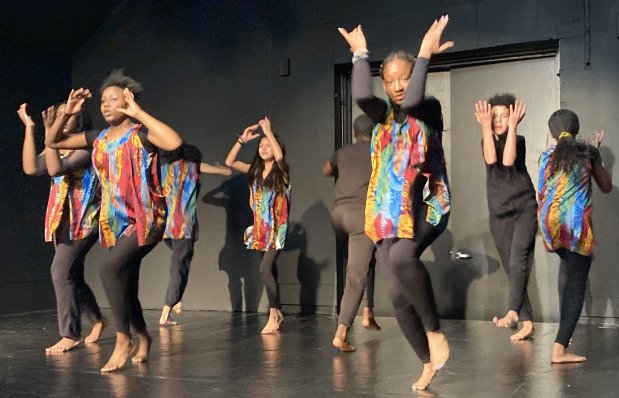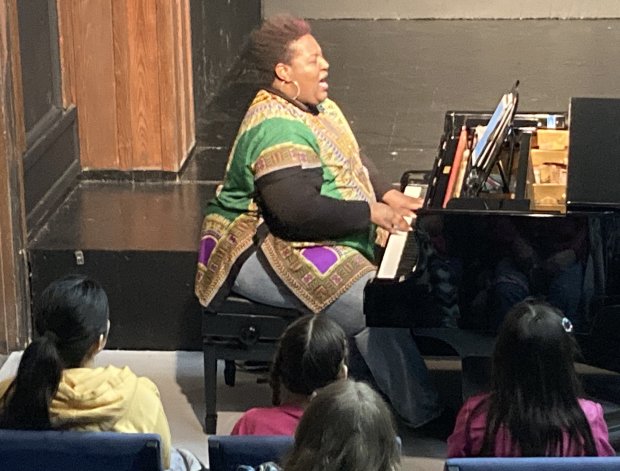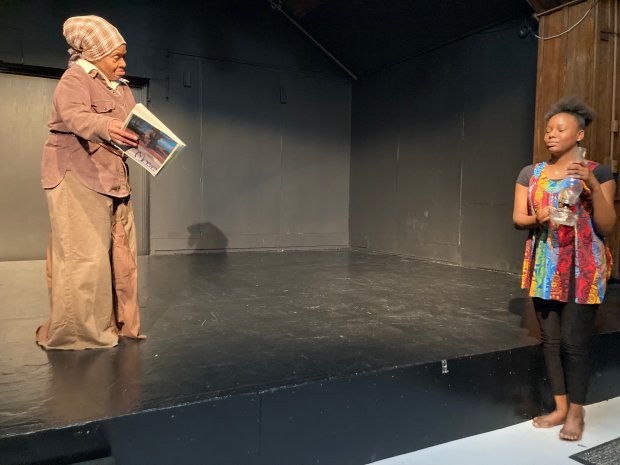Poet Sharon Epps used a chorus of teens during her one-woman reenactment of Harriet Tubman’s efforts to free slaves in the Antebellum United States, and later push for women’s rights, to teach Black history and involve youths as future teachers of the subject.
Early in her dramatic reading, Epps started singing “Swing Low, Sweet Chariot.” As she did, a group of young people in the first row started singing softly with her. They were part of the cast, but others in the audience who voiced the lyrics were not.
“I wanted it to be a singalong,” Epps said. “I wanted people involved, (because sometimes) they have to free themselves. Anything that takes you away from your natural self keeps you in the bondage of your own hell. This is slavery today.”
Epps was one of eight spoken word artists, musicians and dancers taking more than 75 people on a journey through Black history with an eye on the future at the Waukegan Park District’s third-annual Black History Month celebration Saturday in Waukegan.
The Rev. Cory Ratliff, the co-pastor of Waukegan’s Sign of the Dove Church, was the master of ceremonies. He said telling the African American story through artistic performances was akin to the method used by biblical psalmists.
“It’s an expression of our people,” Ratliff said. “Faith is an important part of who we are. It makes us aware as a community, and when we’re aware as a community we stick together.”
Many of the performers like the dancers were young people still in their teens. Park District Commissioner Anton Mathews, who was at the performance, said they represent the future. They will be the storytellers for the next generation or two or three, he said.
“I’m imagining they’ll be telling stories about how far we’ve come and where we are today,” Mathews said. “There were all kinds of people here,” he added, referring to a multiracial crowd. “It was so uplifting.”
While telling Tubman’s story in her own words, Epps talked about her birth into slavery in 1822 in Maryland, her escape in 1849 and her return to slave states to lead hundreds of people to freedom. In the process, she was nicknamed Moses.
“They call me Moses,” Epps said, speaking as Tubman. “I like the name Moses because he helped people to be free. I worked with Susan B. Anthony to help women get the right to vote. If you don’t believe me, read the book.”

During the Civil War, Epps said Tubman was a scout and spy for the Union Army. She was buried with military honors when she died in upstate New York in 1913 at the age of 91.
Starting the celebration after Ratliff’s introduction was singer and pianist Scharema Hannibal. She opened by singing and playing two Duke Ellington songs, including “Come Sunday.”
“He played this at Carnegie Hall in 1944,” Hannibal said, finishing with the lyrics, “Do onto others as you would have them to you,” as the crowd broke into boisterous applause with many standing.

Along with Hannibal and Epps, spoken word artists Gary Moore, Shaquita Blanks and Zion Ari shared their work with the audience, as did the ALATS Dance Company composed of the community’s youths. Dancer Elijah Washington offered a dance he choreographed himself.




